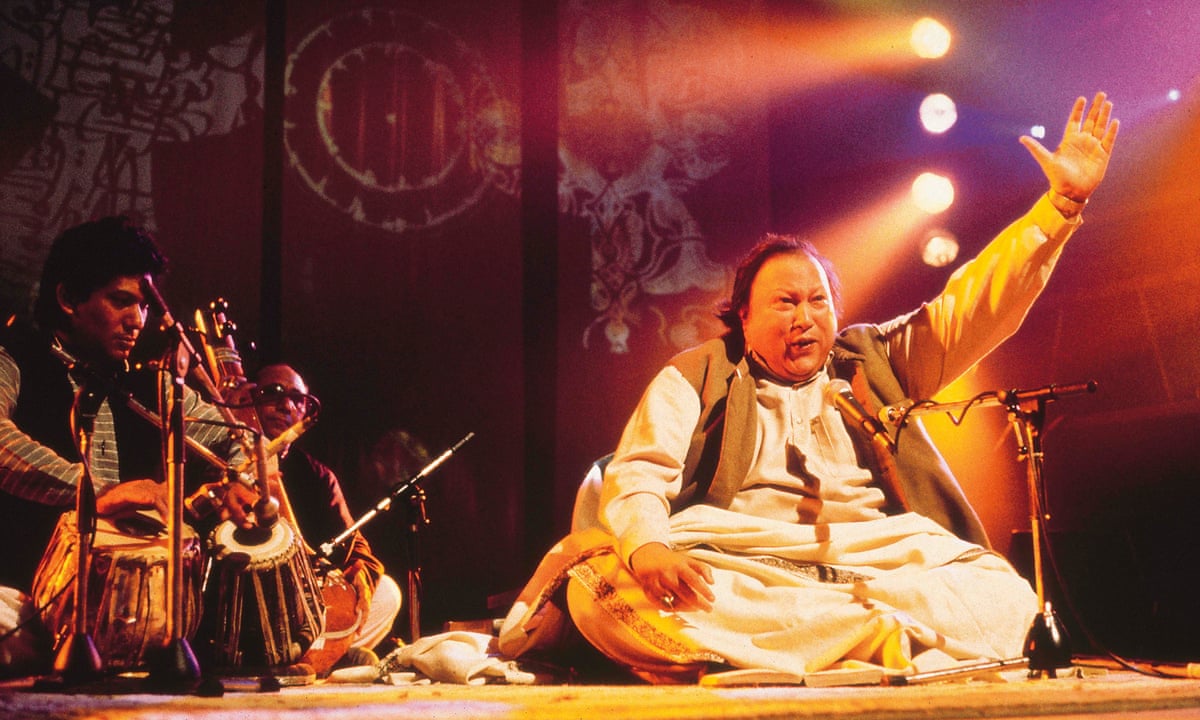Ustad Nusrat Fateh Ali Khan

Nusrat Fateh Ali Khan, born on October 13, 1948, in Lyallpur (now Faisalabad), Pakistan, left an indelible mark as a legendary qawwali singer, songwriter, and music director. Known as the "Shahenshah-e-Qawwali" (the King of Kings of Qawwali), he earned acclaim for his exceptional vocal abilities and mastery of the genre, becoming one of the greatest qawwali singers of all time.
Born into a family with a rich musical heritage, Nusrat Fateh Ali Khan's father, Fateh Ali Khan, was a renowned figure in musicology and qawwali. Initially reluctant to allow Nusrat to pursue qawwali, his natural talent eventually convinced his father to support his musical journey. In 1971, following his uncle's passing, Nusrat officially took the reins of the family's qawwali party.

His debut as the leader of the qawwali party marked the beginning of a remarkable career. Nusrat showcased his vocal prowess in multiple languages, captivating audiences with emotive performances. Early hits like "Haq Ali Ali" exemplified his mastery of sargam improvisations while maintaining the essence of qawwali tradition.

Nusrat Fateh Ali Khan's influence reached beyond Pakistan's borders:
- In 1985, he made his international debut at the WOMAD festival in London.
- Performances in Paris, Japan, and New York solidified his global acclaim.
- Collaborations with South Asian artists and Western musicians showcased his versatility.
- Association with Peter Gabriel's Real World label resulted in successful albums like "Mustt Mustt" and "Night Song."
- Collaborations with rock musicians and composers like Eddie Vedder and Jonathan Elias expanded his musical repertoire.
- His contributions to Pakistani and Bollywood films demonstrated his versatility in composing and performing for the silver screen.

Nusrat Fateh Ali Khan's association with A. R. Rahman's albums and posthumous contributions affirmed his enduring legacy. He received Grammy nominations for albums like "Intoxicated Spirit" and "Night Song."

His influence transcended genres and cultural boundaries, leaving an indelible mark on Sufi music, world music, and beyond. Nusrat Fateh Ali Khan's legacy continues to inspire musicians globally, solidifying his status as an icon in the world of music.
References;
- Brooks, Iris (1997). "Yoga Journal". Yoga Journal. Magazine. Active Interest Media, Inc.: 44–. ISSN 0191-0965.
- "BBC Asian Network – Nusrat: 20 Years On, Nusrat Through the Night! – Jeff Buckley, The Grammys & UNESCO! 11 little known facts about Nusrat Fateh Ali Khan". BBC. Retrieved 14 July 2020.
- Islam, Shamsul (16 August 2012). "Shahenshah-e-Qawwali: Remembering Nusrat Fateh Ali Khan". The Express Tribune. Retrieved 14 July 2020.
- "Nusrat Fateh Ali Khan, Pakistani Sufi Singer, 48". The New York Times. 17 August 1997. Retrieved 20 December 2020.
- "The 20 Best Singers of All Time (VIDEO)". 8 March 2016.
- ^ "World Music Legends Nusrat Fateh Ali Khan". Globalrhythm.net. Archived from the original on 22 February 2019. Retrieved 16 December 2011.
- "Nusrat Fateh Ali Khan: National Geographic World Music". Worldmusic.nationalgeographic.com. 17 October 2002. Archived from the original on 20 March 2013. Retrieved 7 November 2012.
- Ghulam Haider Khan (6 January 2006). "A Tribute By Ustad Ghulam Haider Khan, Friday Times". Thefridaytimes.com. Archived from the original on 16 September 2018. Retrieved 15 March 2012.






































